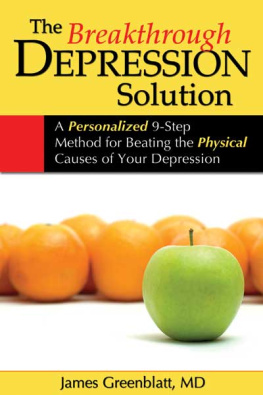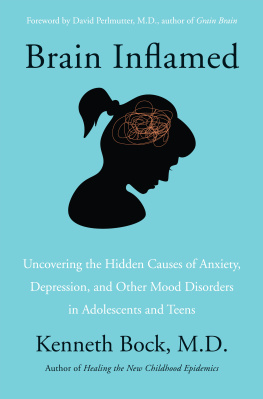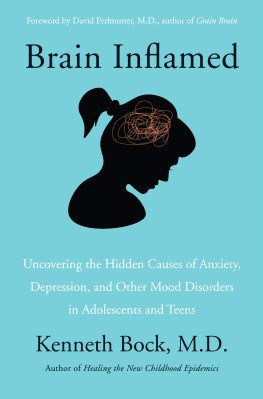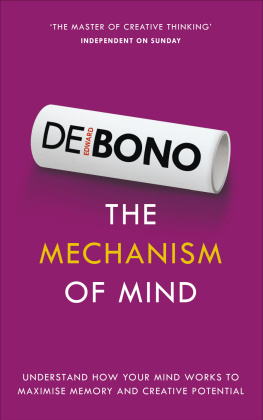Edward Bullmore - The Inflamed Mind: A Radical New Approach to Depression
Here you can read online Edward Bullmore - The Inflamed Mind: A Radical New Approach to Depression full text of the book (entire story) in english for free. Download pdf and epub, get meaning, cover and reviews about this ebook. year: 2018, publisher: Picador, genre: Science. Description of the work, (preface) as well as reviews are available. Best literature library LitArk.com created for fans of good reading and offers a wide selection of genres:
Romance novel
Science fiction
Adventure
Detective
Science
History
Home and family
Prose
Art
Politics
Computer
Non-fiction
Religion
Business
Children
Humor
Choose a favorite category and find really read worthwhile books. Enjoy immersion in the world of imagination, feel the emotions of the characters or learn something new for yourself, make an fascinating discovery.

- Book:The Inflamed Mind: A Radical New Approach to Depression
- Author:
- Publisher:Picador
- Genre:
- Year:2018
- Rating:4 / 5
- Favourites:Add to favourites
- Your mark:
- 80
- 1
- 2
- 3
- 4
- 5
The Inflamed Mind: A Radical New Approach to Depression: summary, description and annotation
We offer to read an annotation, description, summary or preface (depends on what the author of the book "The Inflamed Mind: A Radical New Approach to Depression" wrote himself). If you haven't found the necessary information about the book — write in the comments, we will try to find it.
The Inflamed Mind: A Radical New Approach to Depression — read online for free the complete book (whole text) full work
Below is the text of the book, divided by pages. System saving the place of the last page read, allows you to conveniently read the book "The Inflamed Mind: A Radical New Approach to Depression" online for free, without having to search again every time where you left off. Put a bookmark, and you can go to the page where you finished reading at any time.
Font size:
Interval:
Bookmark:
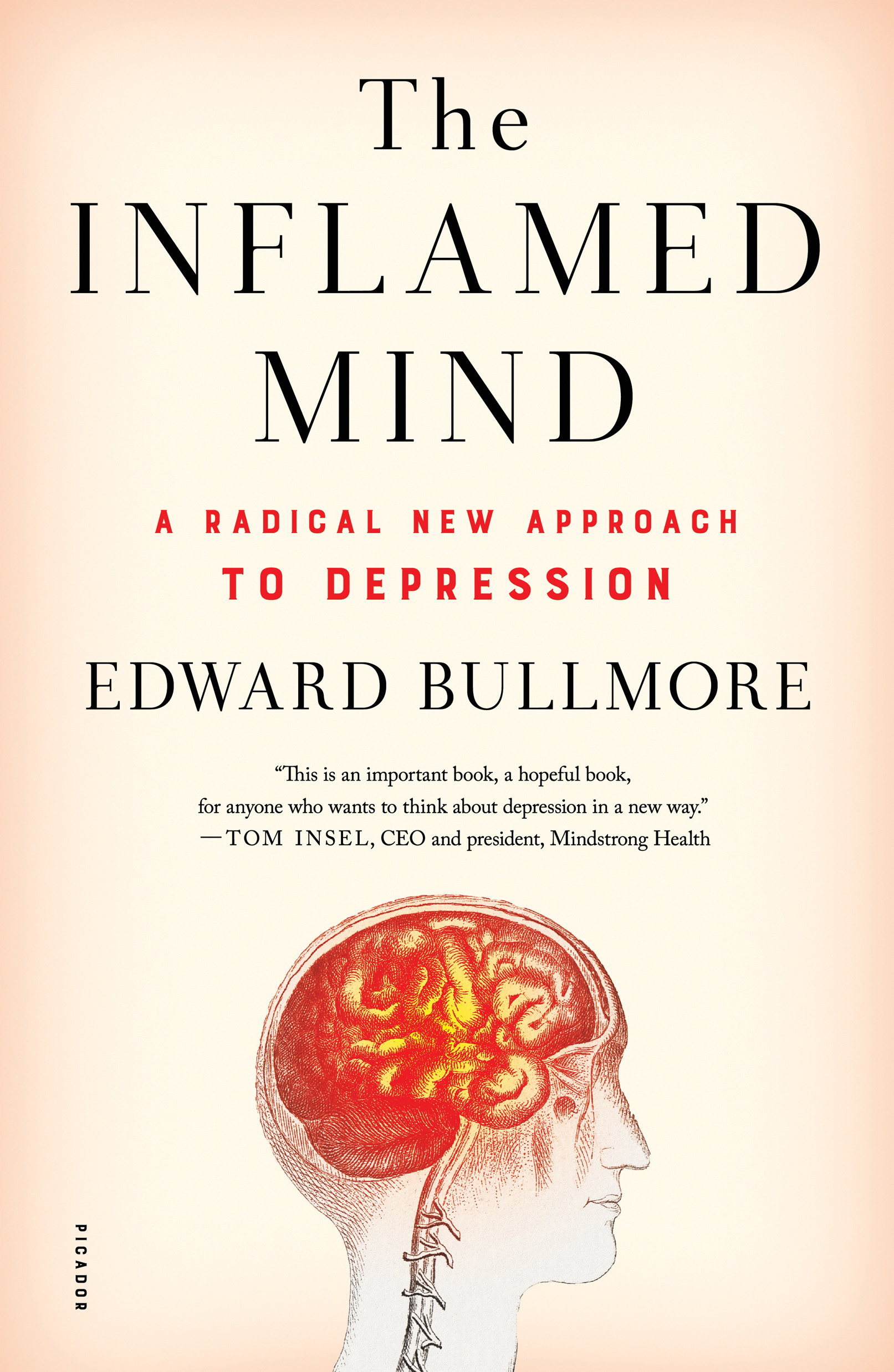

The author and publisher have provided this e-book to you for your personal use only. You may not make this e-book publicly available in any way. Copyright infringement is against the law. If you believe the copy of this e-book you are reading infringes on the authors copyright, please notify the publisher at: us.macmillanusa.com/piracy.
To my family
One of the things that first attracted me to psychiatry, many years ago, was that it tries to deal with the most personal human afflictions: clinical disturbances of our selves, our emotional balances and imbalances, our states of mind and memories, our ideas about the world and its relationship to us. As a young doctor, the richly individual content of mental health symptoms seemed much more interesting to me than physical health symptoms, like ankle swelling or skin itching. It was also attractive to me, from a scientific perspective, that all these mental symptoms must originate from the brain; but it was not yet known how. It seemed likely to me then, and it still does today, that if we could understand more about how mental health disorders are generated by brain mechanisms we would be in a much stronger position to do something about treatment and prevention. We would probably also feel less ashamed or afraid to talk about mental health issues if we knew more certainly where they came from, or what caused them.
So, when I was about 30, finding out more about how mental symptoms originated from the brain became a professional research mission for me. At this time, around 1990, many psychiatrists were focused on how brain chemicals like dopamine and serotonin could cause disorders like psychosis and depression. But it was clear there was an enormous amount more still to understand. I realised that I would need to become a scientist as well as a clinical psychiatrist.
For several years in the 1990s, I was supported by the Wellcome Trust to do a PhD, supervised by Professor Michael Brammer, at the Institute of Psychiatry in London. The first functional magnetic resonance imaging (fMRI) scanners were just starting up, in a few places around the world, and I got involved in mathematical analysis of these new-fangled fMRI data, to make maps of human brain function in healthy people and patients with mental health disorders. I started writing and co-writing many scientific papers on neuroimaging, neuroscience and mental health. This was a very exciting transition for me. I was lucky enough to be in the right place at the right time to catch the first wave of fMRI research, which has since expanded massively into a global science ecosystem. I thought it could only be a matter of time, perhaps a few years, certainly by the time I was 50, before the irresistible flood of new discoveries from brain scanning, and brain science generally, must force radical improvements in how we think about and treat mental health disorders.
It was in that spirit that I started as a Professor of Psychiatry in the University of Cambridge in 1999. At first, I carried on with my brain imaging research, trying to find new ways of measuring and analysing the complex network organisation of the human brain. I am probably most well-known as an academic scientist for my work on network neuroscience or the connectome. But that is not the topic of this book.
As I approached my mid-40s, I couldnt help noticing that, despite what seemed like a tremendous amount of progress in neuroscience internationally, there was no sign yet of any great change in what was happening day-to-day in local NHS clinics and hospitals. I became restless about the prospect of making any difference to psychiatric practice simply by writing more papers about brain scans. I recognised that the most powerful lever of change in the history of medicine was always the advent of a new treatment. I found myself wanting to know more about how new drug treatments were being discovered for depression, psychosis and other disorders.
Thats why, in 2005, I took an unusual chance to start working half-time for GlaxoSmithKline, also known as GSK, one of the UKs biggest pharmaceutical companies. Half the week I spent working in my University lab on the fascinating esoterica of network analysis and the other half I spent working as the director of GSKs clinical research unit, conveniently located about 200 yards down the hall in Addenbrookes Hospital. In the GSK unit, we did a lot of studies to test the effects of new drugs that were in clinical development for psychiatry, neurology and other areas of medicine. It felt exhilarating at times to be inching closer to the promise of new treatments; but then, in 2010, GSK abruptly closed down all its research and development programs in mental health. I realised I was a 50-year-old psychiatrist working for a company that didn't want to do psychiatry any more. And if a company as big and strong as GSK didnt see an opportunity to make therapeutic progress in psychiatry, what did that mean for the prospects of those radical improvements in treatment that I had been confidently expecting to witness for the last 20 years? That is the moment I began to start thinking seriously about the ideas that this book is about.
I became increasingly interested in the work of other scientists who had been pioneering a new field of research that linked the brain and the mind to the workings of the immune system. They called it immuno-psychiatry or neuro-immunology. The first time I heard of it, to be honest, it sounded bonkers to me, for all sorts of good reasons. But as I delved into it deeper, it seemed increasingly plausible that this might be a scientific strategy that was different enough to offer a fresh chance of making therapeutic progress in psychiatry. I talked to lots of people and once again I was lucky. My GSK boss agreed it could be worth looking into and from about 2013 we were supported by the Medical Research Council and the Wellcome Trust to set up research partnerships with other companies and academic experts to find out more about the links between inflammation and depression.
Hopefully that explains how I came to be involved in the immuno-psychiatry research program that I am still working on scientifically; but it doesnt explain why I wrote a book about it. Scientists are highly incentivised to write papers for a technically specialised readership of their professional colleagues, rather than books that almost anyone might read. But as I have spent the last five years or so learning more about how the immune system and the nervous system interact, how inflammation of the body can cause mental symptoms like depression, it has increasingly seemed to me that these questions resonate widely. They touch on some very basic ideas about the relationship between the body and the mind, as well as the traditional difference between psychiatry and the rest of medicine. And they point towards not just a few new anti-depressant drugs but a radically reconfigured dare I say, radically better way of dealing with mental and physical health disorders together, rather than apart, as we currently do.
This book does contain some technical language, especially in relation to the immune system, because if I tried to tell the story without any technical details I would not be telling it like it really is. And it is, I think, a really exciting story of how we could begin to see new science make a surprising difference to mental health. I hope you enjoy it.
Font size:
Interval:
Bookmark:
Similar books «The Inflamed Mind: A Radical New Approach to Depression»
Look at similar books to The Inflamed Mind: A Radical New Approach to Depression. We have selected literature similar in name and meaning in the hope of providing readers with more options to find new, interesting, not yet read works.
Discussion, reviews of the book The Inflamed Mind: A Radical New Approach to Depression and just readers' own opinions. Leave your comments, write what you think about the work, its meaning or the main characters. Specify what exactly you liked and what you didn't like, and why you think so.

